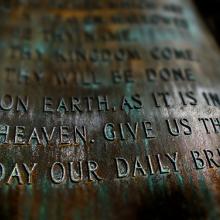Faith
For some months now, I have been ruminating on the writer John Podhoretz’s eulogy in Commentary magazine for his sister Rachel Abrams upon her death, from stomach cancer, at age 62. Commentary effectively being the Podhoretz family house organ, and the Podhoretzes effectively being the mythological family of the origin of neoconservatism, the essay would be of interest to anyone interested in cultural and religious sociology — or at least to me.
I, too, come from a family that has also tended to think of itself in somewhat mythological, contrarian terms — This is what Langstons are like — so a meditation from the heart of another large, bustling family is an immediate and natural draw for me.
But lay that all aside. The eulogy wins, and haunts, because it is the passionate remembrance of a sister by her brother. Despite their being part of a prominent East Coast family, its focus is relentlessly on the small acts of family and home that transfigure quotidian existence. Podhoretz dwells lovingly on Rachel as a housewife, a lifetime foul-mouth, an exuberant and dedicated mother, an artist, and finally a writer who let loose with political commentary in her late fifties as online blogs began gathering steam.
“I loved you, Rachel,” he concludes poignantly, in words I could read over and over. “I liked you. And oh, oh, oh, how I admired you.”
So much of that poignancy is derived from direct address to his sister, who is no longer there to receive it. Having just hit 45, Dante comes to mind: midway-through-the-journey-of-our-life-I found myself within a dark wood for the right way had been lost. Who can know how our days are numbered? The lesson for me is that I should tell of how I love my brother John, even as he lives.
Sojourners supports the National Religious Campaign Against Torture (NRCAT). NRCAT recently released five Youtube videos to counter the claims found in pop-culture that torture is acceptable. Check out this video of people of faith speaking to core faith values that underlie their anti-torture work,, which features Sojourners' Lisa Sharon Harper.
Within the evangelical Christian universe, few things are more damning than being labeled 'Legalistic.' The term evokes images of strict rules, ruthlessness, enforced doctrines, unforgiving judges, and worst of all —unpopularity.
When churches, schools, pastors, institutions, and communities are viewed as legalistic, they are demonized and shunned — sometimes rightfully so.
One disturbing trend I’ve noticed — especially among young believers — is to assume that everything associated with a few of legalism’s attributes: structure, requirements, consequences, and work, is legalistic — it’s not.
Most Americans share a common understanding that many public schools in poor neighborhoods aren’t great. It’s rare that I engage anyone who doesn’t know this basic fact on some level. But what’s less common is a deeper understanding of the extent of the problem. And sadly, even less common than that? Finding individuals who express a deep conviction that educational inequity can be eliminated. Faith communities are poised to add our voices to this much-needed conversation.
Fifteen million children live in poverty in the United States. Given poverty’s impact, many of these children already face additional challenges in their lives. For many young people, education can be “the great equalizer.” A high quality school can provide students with the necessary foundation to go to college and have a variety of opportunities opened to them. Poverty can become a thing of the past. But students growing up in poverty are more likely to attend low-performing public schools. In fact, only 22 percent of children who have lived in poverty do not graduate from high school. Only 9 percent receive college diplomas. And, not surprisingly, given our nation’s historical intersection of racial injustice and poverty, African American, Latino, and Native American students experience some of the nation’s biggest educational inequities.
Author Malcolm Gladwell may not be known for writing on religion. His New York Times best-selling books “The Tipping Point,” “Outliers,” “Blink” and “What the Dog Saw” deal with the unexpected twists in social science research. But his newest book, “David and Goliath: Underdogs, Misfits, and the Art of Battling Giants,” also includes underlying faith-related themes, and not just in the title.
Gladwell said that while researching the book, he began rediscovering his own faith after having drifted away. Here, he speaks with RNS about his Mennonite family, how Jesus perfectly illustrates the point in his new book and how Gladwell’s return to faith changed the way he wrote the book.
Christian culture, along with the spiritual leaders, churches, institutions, communities, and other entities it consists of, are supposed to make our faith stronger. But in many cases the opposite happens, and it actually causes our faith to die. In religious environments often surrounded by cynicism, hypocrisy, hurtfulness, and disappointment, it’s easy to give up on Christianity. Here’s how to prevent spiritual burnout:
1) Avoid Legalism
Historically, Christianity has always struggled with legalism, where churches often forced beliefs and practices on people with domineering power. Legalistic groups thrive on strict rules, ruthlessness, enforced doctrines, and authoritarian judgment.
Various agendas — that are valued more than the loving gospel of Christ — are promoted and pushed onto people. And it wasn’t that long ago (in fact, it still exists) that American believers were expected to be anti-gay, conservative, pro-choice, anti-evolution fundamentalists.
If fear, condemnation, and shame are used as spiritual weapons to gain power, influence, and control — run!
Reviews of the new hit movie Gravity note that it’s an unusually fine science fiction film. What they don’t mention is that the main character represents an increasingly common theme in American religion: The spiritual “none of the above.”
Yes, the special effects are splendid. And I’ll take the word of astronauts who say the visuals capture amazingly well what it’s like to work in the microgravity of near-Earth orbit.
But there are moments where spiritual and philosophical themes take center stage.
(Spoiler alert: I’ll give no more away than I’ve seen in most reviews, but if you really want to know nothing about the movie, see it first.)
I can’t count how many times I’ve heard people within mainline Christian churches note that, though they don’t embrace all of the theological positions of their evangelical sisters and brothers, they are impressed by their aptitude for organizing and affecting change on a large scale. At the same time, I see thousands converge at festivals like the Wild Goose festival in North Carolina, feeling both fed by the invigorating sense of community, but also frustrated to be leaving with the still unanswered question:
What do we do now?
The CANA Initiative, which is a joint collaboration of Brian McLaren, Stephanie Spellers, and Doug Pagitt, seeks to help answer that nagging question. Cana seeks to be the connective tissue that helps hold together communities of faith that share common priorities in addressing the pressing socioeconomic issues of our time.
From their website, “The CANA Initiative brings together innovative leaders from all streams of the faith to collaborate in the development of new ways of being Christian ... new ways of doing theology and living biblically, new understandings and practices of mission, new kinds of faith communities, new approaches to worship and spiritual formation, new integrations and conversations and convergences and dreams.”
Following is an audio interview I conducted with these three key voices in the CANA conversation. We talked about why CANA is needed now, more than ever, and what sort of transformation they hope to affect within the greater Christian body.
Every day, my previously stable faith is replaced with a little more hungry curiosity. I consider this progress.
I posted this brief statement on my Facebook and Twitter accounts yesterday and promptly received quite a bit of interest in return. Not surprising, really, that my typical readership would resonate with such a claim, but I also found some surprising affirmations from those I would not have expected to appreciate my sentiments.
I write fairly often about moving away from emphasis on a propositional faith and toward one that is more implicitly lived out in our daily experience. Said another way, I would much rather have the teachings and values shared by Jesus revealed through my actions and through what people see in me, rather than simply through any particular rhetoric that I offer them as an act of persuasion, or even coercion. This is also selfishly motivated, as I am increasingly convinced that, whereas a faith centered on the proclamation and defense of particular statements is one that lends itself to inertia, a way of life that reveals your values without explicitly having to state them is both more compelling to others and more fulfilling for ourselves.
MARTIN LUTHER KING JR. once said that the greatest Christian of the 20th century was not a member of the church. He was referring to Mohandas Gandhi. A remarkable number of King’s fundamental beliefs—the use of active nonviolence as a tool of social reform, the commitment to loving one’s enemies—can be traced back to the influence of Gandhi, which means that one of the defining figures of 20th century American Christianity was profoundly shaped by the example of an Indian Hindu. As King said in 1958 of the civil rights movement, “Christ furnished the spirit and motivation while Gandhi furnished the method.”
But what of Gandhi’s influences? How did a skinny, middle-class, mid-caste Indian, so scared of public speaking as a student that a classmate had to read his speeches aloud for him, come to lead one of the great liberation struggles of the past century? A new book by Arvind Sharma, professor of comparative religions at McGill University, makes the case that the source of Gandhi’s strength was his spirituality. And while the heart of Gandhi’s faith was Hindu, as King’s was Baptist, the influences were remarkably diverse.
Pointing out that most of the biographies of Gandhi really tell the story of Mohandas Karamchand (the name he was given by his family), not Mahatma (a title that means “great soul” and is given to saints in India), Sharma’s book Gandhi: A Spiritual Biography sets out to give an account of the Mahatma. Sharma quotes Gandhi directly on the importance of highlighting the dimension of spirituality in any attempt to understand him: “What I want to achieve—what I have been striving and pining to achieve these 30 years—is self-realization, to see God face to face, to attain moksha [the Hindu term for liberation]. I live and move and have my being in pursuit of this goal.”
They’re rarely at worship services and indifferent to doctrine. And they’re surprisingly fuzzy on Jesus.
These are the Jewish Americans sketched in a new Pew Research Center survey, 62 percent of whom said Jewishness is largely about culture or ancestry and just 15 percent who said it’s about religious belief.
But it’s not just Jews. It’s a phenomenon among U.S. Christians, too.
Meet the “Nominals” — people who claim a religious identity but may live it in name only.
IN MY MEMORY from nearly 50 years ago, the great pitcher Sandy Koufax is going against my Phillies in the old Connie Mack Stadium in Philadelphia. The records show that such a game occurred on June 4, 1964, the right year for my memory, so it is possibly correct. But I cannot prove I was there that day, nor can anyone prove I wasn’t. For me, it has entered the realm of myth—I may not actually have been there, but in my memory I believe I was. In a similar manner in religious experience, historical events originally recorded as perhaps inexact memories come to be believed as literal truths.
In Baseball as a Road to God, John Sexton uses the categories of the study of religion to explore the meaning of baseball. Sexton, president of New York University, has taught a popular seminar on this topic for more than 10 years, and in this book collects the essence of those classes.
For a baseball fan, the well-told stories of historic players, games, and seasons are by themselves worth reading and will evoke many memories. But rather than a random collection of stories, Sexton groups them in topics—sacred place and time, faith and doubt, conversion and miracles, blessings and curses, saints and sinners—illustrating each with fitting examples. Underlying it all, he proposes, are two words and concepts that link baseball and religion. Both illustrate the significance of the ineffable, “that which we know through experience rather than through study, that which ultimately is indescribable in words yet is palpable and real.” And both have moments of hierophany—a term devised by religious historian Mircea Eliade to signify “a moment of spiritual epiphany and connection to a transcendent plane,” a “manifestation of the sacred in ordinary life.”
Jim Wallis sat down to discuss the government shutdown. His conclusion? It's unbiblical.
The top religion story of 2012 was the “rise of the ‘Nones’” — the one in five adults in the U.S. eschewing any religious label. That trend is now evidenced across the American religious spectrum, including in Jewish communities. About 22 percent of Jews now describe themselves as having no religion, according to a new Pew Research Center survey of U.S. Jews.
“Fully a fifth today of Jews in the United States are people who say they have no religion. They’re atheists, agnostics, or, the largest single subgroup, nothing in particular,” said Alan Cooperman, co-author of the study.
The trend of disaffiliation mimics that of other backgrounds, particularly by age. For example, 93 percent of Greatest Generation Jews (those born between 1914 and 1947) identified as being Jewish by religion, while only 68 percent of Millennial Jews (those born after 1980) say the same.
After reciting what we call the Lord’s prayer one Sunday, I got to thinking about how many times I’d said those words. Thousands? But how many times have I actually thought about what the words mean?
If we pay attention, it’s a prayer that makes us very uncomfortable.* These words of a peasant Jewish rabbi from 2,000 years ago challenge so much about the way we live — all of us, regardless of what religion we follow. If we’re honest, most of us don’t like it and have no intention of living by what it says.
Which presents a question: Isn’t it a problem if we pray one way and live another? Shouldn’t our prayers reflect how we actually try to live?
Along those lines, perhaps we should rewrite the Lord’s prayer and make it conform to what we really believe. In that spirit, here’s a rough draft of what it might sound like if the Lord‘s prayer was actually our prayer.
LAST YEAR on NPR’s “All Things Considered,” I heard the story of Teresa MacBain, a United Methodist pastor who came to the conclusion she was an atheist. The situation was scary and awkward for her. Who could she tell? What would she do now for a living?
She wasn’t trained for any other occupation, but neither could she continue her double life of preaching and public praying while knowing she didn’t believe in any of it.
Lacking someone to confide in, MacBain secretly confessed to her iPhone, “Sometimes I think to myself: If I could just go back a few years and not ask the questions and just be one of the sheep and blindly follow and not know the truth, it would be so much easier. I’d just keep my job. But I can’t do that. I know it’s a lie. I know it’s false.” Eventually, she left the ministry.
As I listened to MacBain’s interview, I empathized with her. After 30 years of serving as a Mennonite pastor, I often wonder whether I still believe the things I’ve always said I believed. My questions about God have become deeper, while my previous answers now sound shallow. The thought that I might not believe in God is frightening. It threatens my identity and worldview—not to mention my occupation. And yet I haven’t arrived at MacBain’s atheism. Instead, my doubts have been folded into my faith.
We live in a church context where so many embrace unbiblical either/or understandings of Christianity: Either evangelism or social action, either inward journey or outward journey. And on and on.
It is the widespread onesidedness that makes Rich Nathan’s new book so exciting.
Meet “Our Lady of Perpetual Exhaustion,” a saint everyone probably can relate to.
The chaos of everyday life and the methods we use to overcome it are on display at the “Our Lady of Perpetual Exhaustion” exhibit in two D.C. galleries.
“We all have coping mechanisms,” said Cynthia Farrell Johnson, creator of the exhibit’s theme. “And for most of us, part of our coping mechanism is our spiritual life.”
1) Jesus Avoided Labels
In fact, a large part of his ministry was breaking down preconceived titles, trying to bring about a world where there would be no differentiation between Jew or Gentile. He promoted the idea that loving God trumped racial, ethnic, social, religious, and political identities.
This doesn’t mean we’re simply “all the same underneath.” Jesus recognized that people had distinct differences, on both a personal and communal level. He embraced unique cultures and traditions and utilized them to reveal his glory, recognizing and valuin
Any right-thinking stranger on our shores must read our daily news and think our nation has gone mad. We have cultivated the ability to end lives quickly; and yet we are continually surprised when our fellow citizens use the tools we have devised for exactly the purpose for which we invented them. Come to think of it, I think we’ve gone mad, too.
But our madness is not one that can be cured by laws alone. Laws can help to restrain us, and can help by making it a little less easy for us to find ourselves armed for murder. But we need something more, something that churches are better equipped to offer than legislatures are.
What we need right now is a richer moral imagination. We need better stories to tell ourselves, stories about the kind of people we could be. We need, more than anything, to learn to help one another to do the hard work of choosing not to pull the trigger.

















